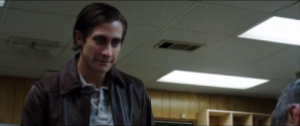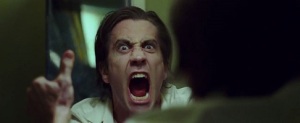On its most basic level, Nightcrawler (Dan Gilroy, 2014) is a heavy-handed satire that indicts the “if it bleeds, it leads” mentality and the normalization of violent and gruesome images on television news. Since images of the Vietnam War made their way into people’s homes via television screens, there have been debates about how much is too much, and what one can and cannot show, ethically, on television.
However, Nightcrawler also contains a much more interesting satirical thread in the figure of its ruthless entrepreneur Lou Bloom,* played by Jake Gyllenhaal, a young man who films accident and crime scenes and sells the footage to the news. The film satirizes the discourse of bootstrapping and “job-creating” entrepreneurism that rose (from its continual background presence) to particular visibility during the 2012 presidential campaign.
The last campaign may seem like a distant memory for many, particular given our 24-hour news-cycle mindsets. My students this semester didn’t even remember “binders full of women.” Remembered or not, the Romney/Obama campaign cycle focused heavily on how to lift the country out of the Great Recession. For Romney, that meant eliminating the minimum wage, increasing unpaid internships, and stimulating private-sector entrepreneurs to create the jobs and reduce unemployment. He was skewered by liberal and mainstream media outlets for depicting himself as having bootstrapped his way to riches (“Everything that Ann and I have, we have – we earned the – old fashioned way. And that’s by hard work”), for advising college kids to start businesses by borrowing a little money (like, $20,000) from their parents,** and for his now-infamous 47% remarks. Discursively, Romney was framed as a man who didn’t care about the average American, or the average employee, and who promoted a broken and ruthless brand of entrepreneurial capitalism that would serve to make the rich richer without improving the lives of “average” people.

Image source: Mitt (Greg Whiteley, 2014; available on Netflix)
Nightcrawler takes the ideas espoused by the Romney campaign, and the discursive fashioning of that campaign by an unsympathetic press, to their logical extreme. Lou starts the film unemployed; he has turned to stealing manhole covers and copper wire from abandoned buildings to make money. But he’s also self-educated; he combed the wealth of the internet and imbibed all of the employment advice and entrepreneurial common sense he could find. Early in the film, as he tries to weasel his way into a job at the scrap yard where he is selling his ill-gotten goods, Lou gives his elevator speech:
“Excuse me, sir. I’m looking for a job. In fact, I’ve made my mind up to find a career that I can learn and grow into. Who am I? I’m a hard worker. I set high goals and I’ve been told that I’m persistent. Now I’m not fooling myself, sir. Having been raised with the self-esteem movement so popular in schools, I used to expect my needs to be considered. But I know that today’s work culture no longer caters to the job loyalty that could be promised to earlier generations.”
Lou’s words appear benign. Who among us doesn’t want to think they are a hard worker who sets goals and has persistence? And Lou seems humble, actively countering the anti-millennial discourses that indicts that generation for its entitlement and narcissism. He’s a go-getter, what critic Anthony Lane calls “an entrepreneur, in a fine, self-improving American tradition.” But Lou is also ethically blind—he cannot understand that the scrap yard owner won’t hire a thief.

Also, he’s super creepy looking.
Lou’s hard work, high goals, and persistence eventually lead him to blackmail and sexual exploitation. After selling one short clip to a news channel for a few hundred dollars, he begins to tell people he runs “a successful TV news business.” He hires an unpaid intern, Rick (Riz Ahmed), continually promising a promotion and a wage that he never intends to deliver. When he tells Rick that “Good things come to those who work their asses off,” it isn’t a motivational truism but a thinly-veiled physical threat. Lou is a capital creator and brand creator (with his company’s name, Video News Production), but not a job creator, and certainly not a nice-guy bootstrapper who plans to pull others up with him.
Like the high-profile white collar professionals who brainstormed the subprime mortgage fiasco that contributed to the Great Recession, Lou exhibits a reckless disregard for ethics and the well-being of others, and this recklessness leads him to financial success. Some critics have taken Lou for a sociopath or as suffering from some other mental illness. However, pathologizing the character undercuts the film’s satire and denies the pervasiveness of this sort of mindset within corporate America. Lou’s “sociopathy” is just everyday corporate practice, and his big break delivers a stinging satirical bite: Lou makes his break while exploiting an affluent white family. The second set of footage he sells to the news networks to conclude the story makes him enough money to expand his operation by investing in several vans–and several more unpaid interns. His big break shows that no one is safe from his unethical entrepreneurism, regardless of class or economic status, cementing the film’s reactionary liberal satire of the sort of values that Romney embodied and promulgated on the campaign trail.
*Yes, James Joyce’s Ulysses and Leopold Bloom resonates here as well, the wandering man drifting through his city.
**This incident, while still definitely indicative of class and economic privilege, was pretty overblown by some media sources. Romney was telling the story of Jimmy John, the sandwich shop owner and franchiser. Romney said, “We’ve always encouraged young people take it, take a shot, go for it. Take a risk, get the education, borrow money if you have to from your parents. Start a business.” In this story, though, he also said that Jimmy John, “said he borrowed $20,000 from his dad” to start a restaurant, and it didn’t seem to occur to Romney at the time that a pretty high percentage of American parents cannot give their child $20,000 because they’re living paycheck to paycheck, or are underwater on their mortgage.
Lindsey Decker is a fifth-year Ph.D. candidate studying Film and Television in the Department of English. Her dissertation examines questions of transnational cinema in self-reflexive British horror films.


